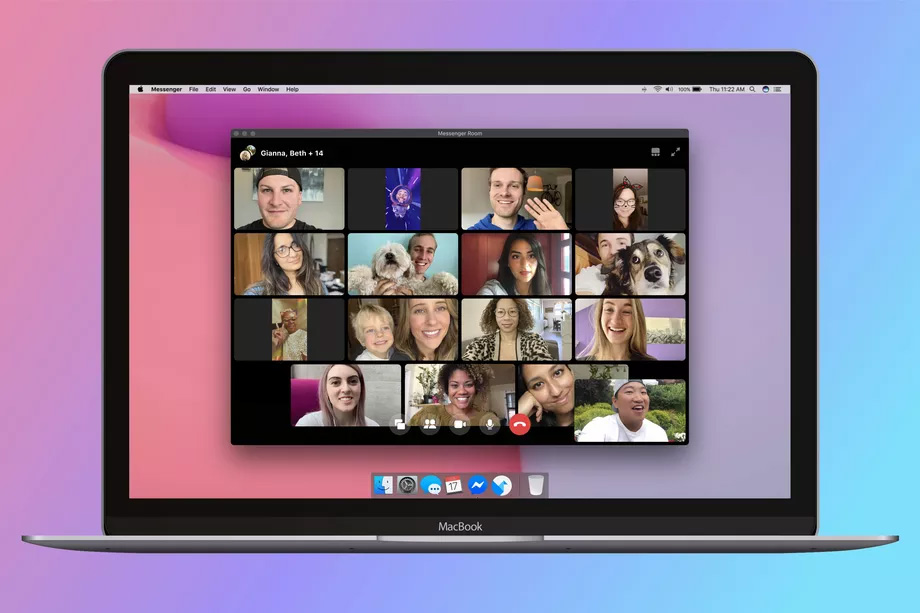
/cdn.vox-cdn.com/uploads/chorus_image/image/66703771/2._Messenger_Rooms_MAIN_Desktop.0.jpg?w=980&ssl=1)
Facebook is rolling out a suite of new products to expand its capabilities in video chat. The company today announced Messenger Rooms, a tool for starting virtual hangouts with up to 50 people and allowing friends to drop in on you whenever they like. It’s also doubling the capacity of video calls on WhatsApp from four people to eight, adding video calls to Facebook Dating, and adding new live-streaming features to both Facebook and Instagram.
CEO Mark Zuckerberg announced the features in a live stream today. In an interview with The Verge, Zuckerberg said the new video features were built in line with the company’s shift toward creating more private messaging tools.
“Video presence isn’t a new area for us,” he said. “But it’s an area that we want to go deeper in, and it fits the overall theme, which is that we’re shifting more resources in the company to focus on private communication and private social platforms, rather than just the traditional broader ones. So this is a good mix: we’re building tools into Facebook and Instagram that are helping people find smaller groups of people to then go have more intimate connections with, and be able to have private sessions with.”
:no_upscale()/cdn.vox-cdn.com/uploads/chorus_asset/file/19922591/1.jpg?w=980&ssl=1)
The moves come as the global pandemic has forced hundreds of millions of people to stay indoors and rely on digital tools for nearly all of their work, school, and play. More than 700 million people are now making calls on Facebook Messenger and WhatsApp every day.
But competitors are also surging. Zoom, which began life as a simple tool for business videoconferencing, rocketed from 10 million users in December to more than 300 million today. Houseparty, an app for virtual hangouts with friends that Facebook had previously cloned before abandoning the project last year, now routinely hovers at the top of app store download charts. It gained 50 million users over the past month.
The rapid growth of alternative social products has always been cause for concern at the famously paranoid Facebook, which devotes significant resources to monitoring emerging social products and then acquiring the companies behind them or copying their features. While we are still in the first few months of the COVID-19 pandemic, it’s already clear that consumer behavior is changing to cope with it — and that Facebook’s existing product lineup has not met demand.
:no_upscale()/cdn.vox-cdn.com/uploads/chorus_asset/file/19922601/3._Messenger_Rooms___News_Feed_Image.jpg?w=980&ssl=1)
Of everything announced today, Messenger Rooms promises to be the most significant. The feature, which Facebook says will be available in the company’s products globally sometime in the next few weeks, will allow up to 50 people to join a call. The room’s creator can decide whether it’s open to all or lock it to prevent uninvited guests from joining. You’ll be able to start a room from Messenger and Facebook to start. Later, rooms will come to Instagram Direct, WhatsApp, and Portal. Guests can join a room regardless of whether they have a Facebook account.
While in a room, you can play with Facebook’s augmented reality filters or swap out your real-life background for a virtual one. Some backgrounds offer 360-degree views of exotic locales, the company said. And a new slate of AR filters will help brighten up dark rooms or touch up users’ appearances.
Room calls are not end-to-end encrypted, but Facebook says it does not view or listen to calls. The creator of a room can remove participants at any time, and rooms where illicit behavior is taking place can be reported to Facebook. (WhatsApp video calls are end-to-end encrypted, offering an extra layer of protection to users.)
:no_upscale()/cdn.vox-cdn.com/uploads/chorus_asset/file/19922603/4._Messenger_Rooms__Groups_Image.jpg?w=980&ssl=1)
Zoom saw a surge in malicious behavior as it became the world’s default meeting app, with racist, bigoted, and pornographic “Zoombombings” roiling meetings all over the world. Zuckerberg said Messenger Rooms were designed with strong privacy controls, and that the feature’s reliance on connections with your real-life friends and family make it less likely that it will be used to harass people. For groups where people don’t know each other as well, moderators will be able to kick people out of rooms.
“A lot of the time that I’ve spent on this over the last few weeks as we’ve been building this out and getting ready to ship has been on privacy, security, integrity reviews, and how do we make sure that a lot of the use cases that that have been problematic around Zoom are not going to be things that are replicated here,” he said.
Facebook Live will add back a feature called Live With that enables users to invite another person to stream with them. The donate button will become available on live streams, allowing users to raise money directly from their broadcasts in the countries where fundraisers are available.
:no_upscale()/cdn.vox-cdn.com/uploads/chorus_asset/file/19922605/11._Instagram_Live_Image.jpg?w=980&ssl=1)
Instagram will begin allowing users to post live streams to IGTV as well as to Instagram stories after they finish a stream, and Instagram Live broadcasts will become available on the desktop for the first time.
Users with Facebook’s Portal display will also get the ability to go live to pages and groups, the company said. Portal users can already go live from their own profiles.
But live-streaming also has a dark side, and Facebook faced criticism after introducing live-streaming when it was used to broadcast acts of violence. The company removed 1.5 million copies of the Christchurch terror attack in the days after the video, which was broadcast live on Facebook.
Rooms will be available in Messenger today in nearly all countries where Facebook is available, the company said. It will become available inside the Facebook app in a handful of unspecified countries today and roll out globally within coming weeks.
Source: The Verge


